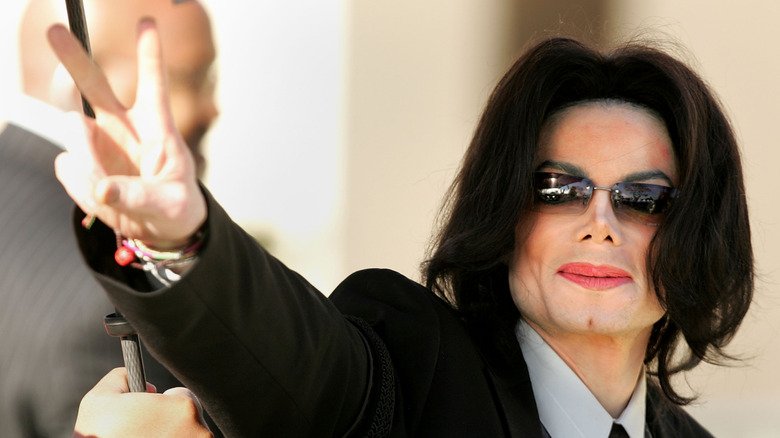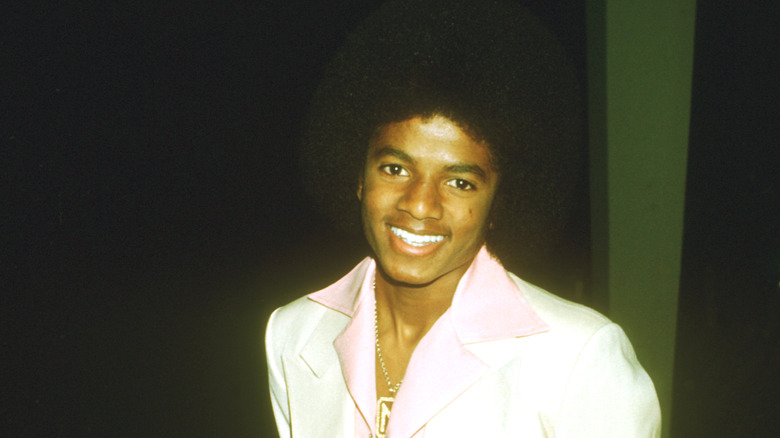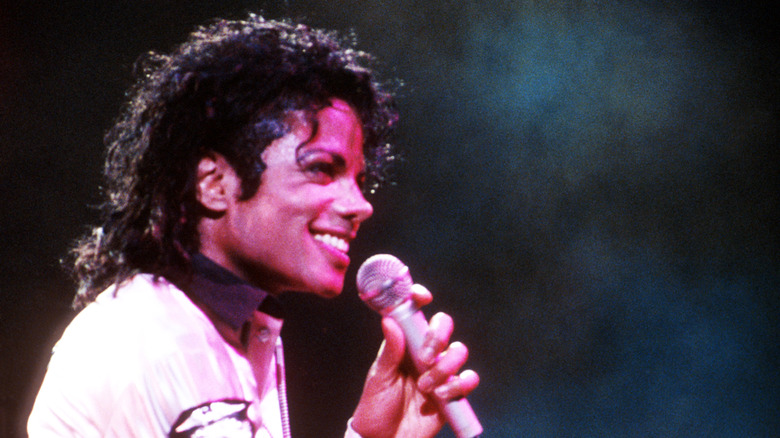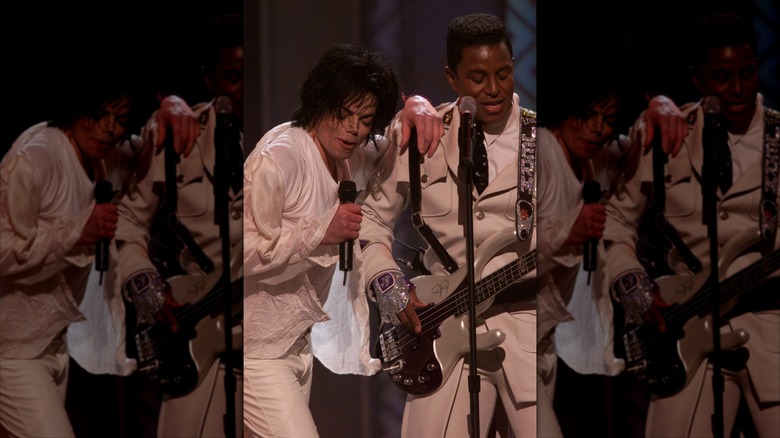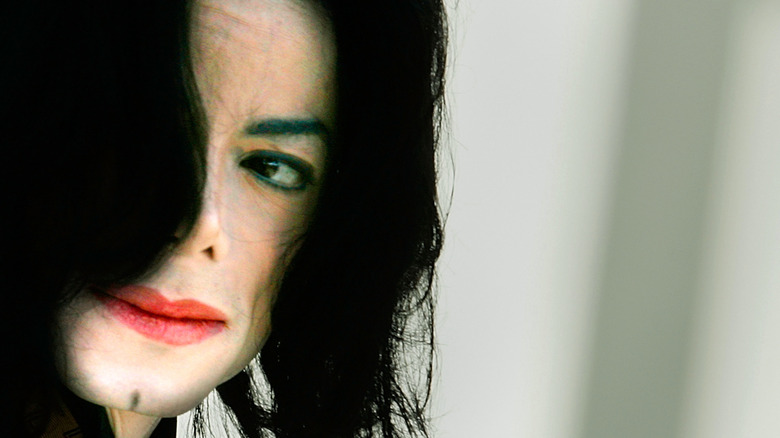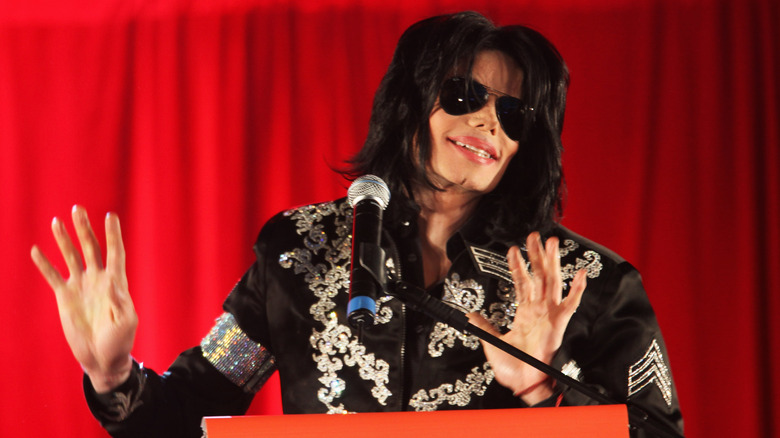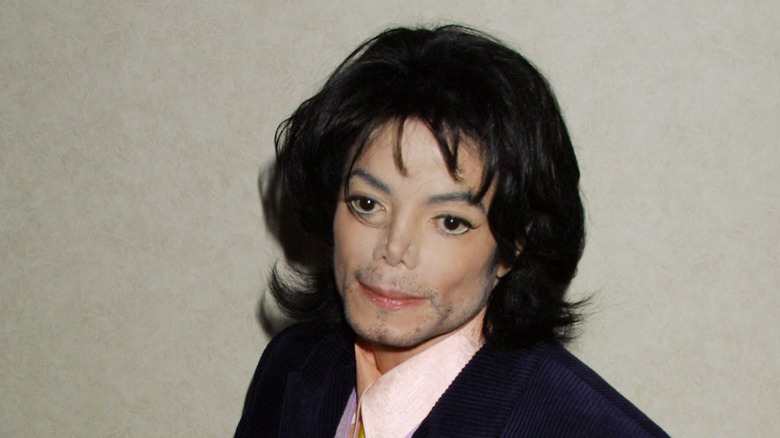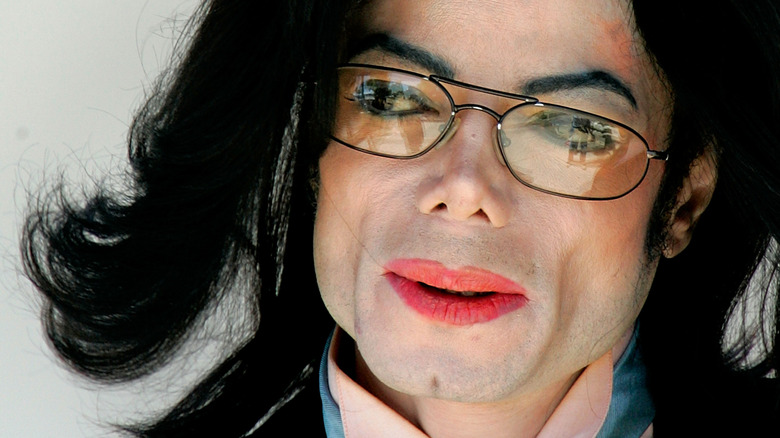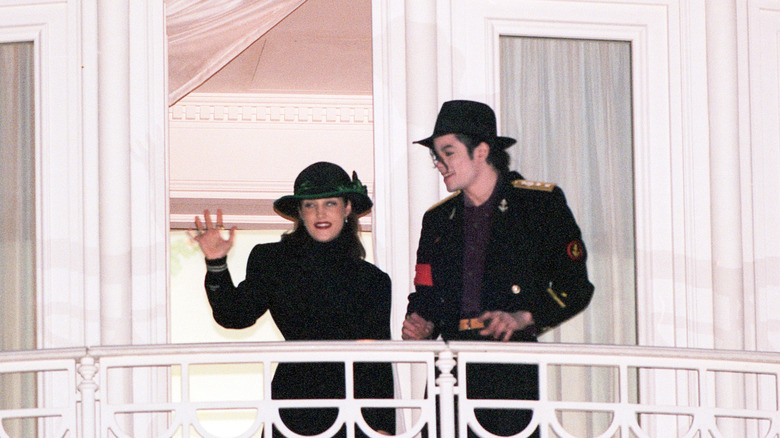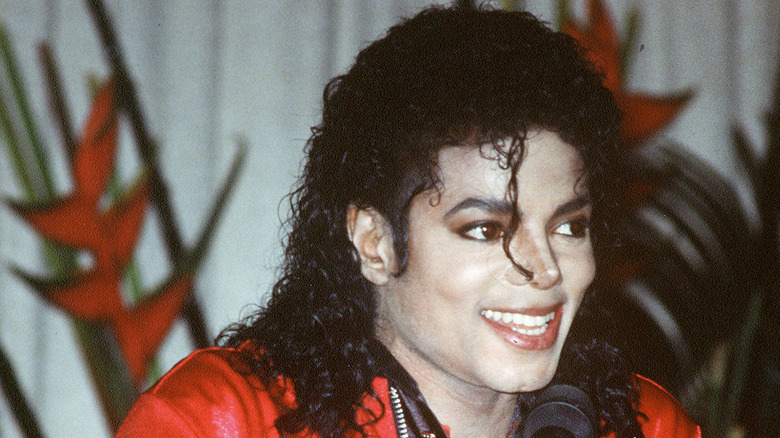Things That Came Out About Michael Jackson After He Died
We may receive a commission on purchases made from links.
Michael Jackson was one of the 20th century's biggest musical stars, whose discography from the late 1970s to the early 1990s defines the period. Decades on, his output has also continued to find an audience, with hits including "Billie Jean," "Smooth Criminal," and "Beat It" still getting hundreds of millions of streams while "Thriller" has now established itself as an evergreen Halloween classic.
But the icon who first came to prominence as a child star in the Jackson 5 in the early 1970s was also a hugely controversial figure, with a bizarre luxury lifestyle and tumultuous personal life which was often the subject of tabloid headlines. He was also at the center of numerous legal battles, which included disturbing allegations of child sexual abuse, the public nature of which damaged his reputation in his later years. Nevertheless, Jackson's tragic death on June 25, 2009, at the age of 50 was met with an outpouring of grief from his millions of disbelieving fans, who sent his music soaring back into the Billboard charts.
Since then, revelations about Jackson, several of whose songs including "Scream" and "Leave Me Alone" railed against press intrusion, have continued to surface, giving fresh insights into one of pop music's most closely examined lives.
His cosmetic surgery addiction began after vitiligo treatment
Michael Jackson's ability to generate headlines was legendary, with a notorious offstage life which at times came to overshadow his music and artistry. In particular, the tabloid news outlets of the 80s, 90s, and 2000s profited from a cottage industry which involved simply publishing the latest paparazzi photos of Jackson and commenting in outraged fashion about his changing physical appearance.
The shape of his nose, eyes, and chin also underwent significant changes over the years, to the point at which towards the end of his life he bared little resemblance to the young man who had proved himself as a grown-up star in the late 1970s with hits like "Rock With You" and "Don't Stop 'til You Get Enough." Despite his changing looks, Jackson denied that he had sought out cosmetic surgery, claiming in interviews that he had only ever had surgery on his nose and that it was a practical intervention to improve his vocal range.
A more controversial aspect of his transformation, however, was his changing skin tone, which became noticeably lighter from the late 1980s onward, leading to accusations that Jackson was purposefully attempting to play down his African-American heritage. The truth, however, was that Jackson was suffering from vitiligo, a condition which affects skin pigment. After Jackson's death, his mother, Katherine, told Oprah Winfrey that he first turned to cosmetic surgery so that vitiligo wouldn't leave him looking like a "spotted cow," but that he became addicted to it thereafter. "He had more than two, he was just embarrassed," she admitted (per Today).
Jackson's secret Sega project
By the early 1990s, Michael Jackson had firmly cemented his place as the King of Pop, with a string of bestselling hits under his belt including 1982's "Thriller," 1987's "Bad," and 1991's "Dangerous," three of the biggest selling studio albums of all time. "Thriller" had seen Jackson elevate the music video to an art form, and while he was continuing to enjoy musical dominance during the period, he was also looking to branch out. He released the movie "Michael Jackson's Moonwalker" in 1988, which was followed in 1990 by an arcade and SEGA Genesis video game of the same title.
The game's success led to a continued partnership between Jackson and SEGA, which an investigation by HuffPost claims saw Jackson join the team for the Japanese game company's forthcoming "Sonic 3." Jackson was reported to have put himself forward to provide music for the game and indeed created several compositions which ended up in the finished product. However, he left the project before its completion due to his apparent dissatisfaction with how his music had been modified to fit the technical requirements of the Genesis console and remained uncredited. SEGA has never officially confirmed Jackson had worked on the project, but HuffPost spoke to several members of the "Sonic 3" music department who have insisted that he was involved and highlighted that aspects of the game's soundtrack were later recycled for Jackson's own music.
Jackson's 9/11 near miss
The death of Michael Jackson in 2009 led to renewed interest in his work and life story, including further scrutiny of his difficult childhood and early career. As such, members of the Jackson family, especially his sister, R&B icon Janet Jackson, and former members of the Jackson 5 who performed with Michael while he was a child, were now first in line to give their insights into the tragic star's controversial life.
One of these people was Jermaine Jackson, who in 2011 released a memoir about his younger brother titled "You Are Not Alone: Michael Jackson through a Brother's Eyes." As well as commenting on the difficulties that Michael faced during his lifetime, including his 1984 onstage accident in which he suffered second-degree burns, his chronic pain, and decades-long use of drugs, Jermaine made one striking claim which made headlines.
According to Jermaine, on the eve of the terror attacks of September 11, 2001, Michael and his mother stayed awake until four in the morning, which meant he was unable to keep his appointments the following day. One of these was at the World Trade Center in New York, which would become the target of a deadly attack that took the lives of 2,753 people at the site. According to Jermaine, Michael was fortunate not to have been there.
The King of Pop in Bahrain
In the few years after his apparent 9/11 near miss, Michael Jackson's life spiraled into chaos. In 2001, he waged a feud against his label, Sony Music, for ownership of his master tapes, calling the label's Chairman Tommy Mottola racist in his dealings with artists. In 2002, he became the target of attacks after dangling his son Blanket over the edge of a balcony in a Berlin hotel. In 2003, he was arrested and charged with 10 criminal counts concerning alleged sexual abuse of a minor and became the center of a media frenzy as he went on trial.
Jackson was found not guilty in 2005, but his image was in tatters. And in the aftermath of the trial, he took an unusual step to retreat from the public eye. As was publicized at the time, he decided to accept an offer from Sheikh Abdulla bin Hamad al-Khalifa, a prince of Bahrain, to go and live in the country at the royal family's expense. Abdullah was a huge fan of Jackson's and had musical ambitions of his own; it was his intention to collaborate with the King of Pop on an album during his time in Bahrain.
But it all ended 11 months later when Jackson left Bahrain, leaving Abdullah to recoup his losses in court. NBC reported that the Sheikh sued Jackson for $7 million. Guy Holmes, who was brought in to manage the project, later admitted that Jackson was likely suffering from depression after his court case, which affected his ability to work, and had his head turned from the project by lucrative offers of live shows elsewhere, per The Guardian. Three demo songs were recorded with the Sheikh, but are unlikely to ever see the light of day.
Michael Jackson was drowning in debt at the time of his death
Another aspect of Michael Jackson's life that was falling apart during the 2000s was his finances. As Guy Holmes recalled during an interview with The Guardian in 2021, when he joined Jackson's team the singer was almost bankrupt, with 47 active lawsuits against him and a monthly bill of $4.5 million in interest against a personal loan of $272.5 million. No wonder his head was so easily turned by offers of money.
Indeed, in the months before his death Jackson had been preparing for the much publicized "This Is It" show, a 50-date concert residency in London's O2 Arena. At the time it was announced, many suspected that the deal had been brokered as a way for Jackson to overcome his known financial difficulties and get him out of debt.
However, it was only in the aftermath that the exact details of his financial situation came to light. In a court hearing in 2013, a forensic accountant testified that Jackson's debts had ballooned to between $400 million and $500 million at the time of his death.
His addiction to painkillers had continued
In the months leading up to the planned opening of "This Is It," Michael Jackson was in training with actor and bodybuilder Lou Ferrigno, who had been putting the star through his paces in preparation for residency and a rumored world tour thereafter. Despite appearing in public in a wheelchair just months earlier — and one biographer eerily predicting in December 2008 that Jackson had six months to live — Ferrigno claimed that Jackson was in top shape as he prepared for the concerts. To those around him, he reportedly seemed enthusiastic, healthy, and composed, despite remaining at a low weight throughout rehearsals.
Little did they know that during that time, Jackson was dependent on several prescription drugs, and it later transpired that his personal physician, Dr. Conrad Murray, was regularly injecting him with medication to help him overcome insomnia. Jackson had gone public about attending drug rehabilitation in 1993, having first become addicted to painkillers after being prescribed them to overcome injuries after a notorious accident in 1984 when Jackson suffered painful injuries after his hair caught fire while filming a concert for a Pepsi commercial. His cause of death was later determined to have been cardiac arrest resulting from an overdose of prescription drugs.
Michael Jackson's bizarre and tortured final months
Dr. Conrad Murray, who administered the fatal dose that killed Michael Jackson, was later convicted of involuntary manslaughter. At his trial, he described how the singer was addicted to the anesthetic propofol and referred to it in typical childish language as his "milk." The prescription drug was identified in Jackson's autopsy as the main substance that contributed to his overdose.
Other bizarre details of Jackson's final months also came to light following his death, including the fact that the 50-year-old continued to share his bed with a toy doll when he slept — it was with him when he died. In his final months, Jackson's drug use reportedly left him with slurred speech, and those involved in staging the concert admitted that despite promoters attempting to project the public image of an artist returning to his peak, he was often too weak to attend rehearsals and that amid the strain, his behavior was often erratic.
Posthumous allegations come to light
Michael Jackson faced two rounds of child sexual abuse allegations during his lifetime. The first emerged in 1993 when an abortive LAPD investigation was followed by the family of an alleged victim suing Jackson for $20 million. A further three boys were reportedly identified as alleged victims in 1994, though prosecutors refrained from filing charges when the main accuser declined to testify. A decade later, the Martin Bashir documentary "Living with Michael Jackson" portrayed him as having an intimate friendship with a young cancer survivor, the reaction to which prompted Sant Barbara Sheriff's Department to raid Jackson's Neverland Ranch and file charges, though as already noted Jackson was acquitted in 2005.
Though in some quarters suspicion of Jackson continued after his acquittal, biographer Stacy Brown told Reuters that the reaction following his death proved the singer's "image has been rehabilitated — something that he might not have been able to do had he been alive." However, in 2019 HBO released a new two-part documentary, "Leaving Neverland." In it, two men who had become close with Jackson as children alleged that the singer had abused them over the course of several years. The two had previously filed suits against Jackson's estate, but they had been rejected by the courts.
Jackson's stunning admission to Lisa Marie Presley
Way back in 1994, as Michael Jackson was reeling from the first round of sexual abuse allegations against him, the singer shocked his fans around the world with some unexpected news. He and Lisa Marie Presley were in a romantic relationship, which made the headlines after their sudden marriage in the Dominican Republic on May 26 that year, less than three weeks after Presley's divorce from actor and musician Danny Keough.
Presley reminisced in her memoir, "From Here to the Great Unknown," co-written with her daughter Riley Keough, that the early days of her relationship with Jackson were the happiest of her life. Despite being blindsided by his interest in her, she claims that he was a fun and caring person who put her at ease with his normality, which she says remained undimmed by his incredible star power. Shockingly, despite Jackson being linked romantically to numerous high-profile celebrities including Brooke Shields and Tatum O'Neal in the past, Presley claims that at the start of their relationship, Jackson, who was 35 at the time, informed her that he was still a virgin.
The couple's marriage fell apart shortly after, with Presley suspecting that Jackson had used their union as a source of good press after his legal issues; indeed, their kiss onstage at the MTV Video Awards shortly after their wedding seemed like a PR stunt. She claims that her former husband's use of drugs had also come to light and that he had started to act differently toward her before she filed for divorce in 1995. Presley died tragically in 2023, at the age of 54.
Jackson's provisions for his children
Michael Jackson has three children, the oldest of whom, Prince, was just 12 years old at the time of his father's death. His daughter, Paris, was 11, while Jackson's youngest son, Bigi, then known as Blanket, was 7. Jackson had been criticized during his lifetime for his treatment of his children, not least the Berlin hotel incident involving baby Bigi. He was also notorious for covering the children's faces with handkerchiefs and masks during public appearances, though after his death members of his family including Jermaine Jackson rallied to his defense, arguing that his brother had obscured their faces for the sake of their privacy and had their best interests at heart.
Similarly, it later emerged that Jackson had acted responsibly regarding his children when it came to providing for them in the event of his death. Though the Michael Jackson estate has been the subject of continuous legal dispute ever since his death with Jackson's children still fighting for their $85 million inheritance, according to Ladbible, Prince, Paris, and Bigi have not gone wanting over the years. Their father's will stipulated a monthly stipend of around $60,000 for their upbringing, per a 2009 Spiegel article. Jackson's mother, Katherine, was given another $26,000 per month, and entrusted with care of his children after his death.
Newly unearthed Michael Jackson songs
The years immediately following Michael Jackson's tragic death saw the release of a flurry of commercial projects that, to put it bluntly, were rushed out to capitalize on the enormous resurgence of interest in his life and work. In 2009 Motown and Sony released several posthumous collections and remix albums of his work, while rehearsal footage of his upcoming residency was given a cinema release as "This Is It," along with an album. The following year, Epic Records and Sony Music Entertainment released "Michael," an album assembled from outtakes that was widely criticized by fans and collaborators including the Black Eyed Peas' Will.I.Am, who called the release "disrespectful" and at odds with Jackson's professionalism when it came to studio releases (per The Guardian). It also came under criticism for apparently featuring a Jackson impersonator on three tracks, which led to legal action and the songs being pulled from streaming. Another album, "Xscape," was released in 2014.
For years, it was thought that Jackson's vault of unreleased music had been plumbed for everything worth sharing with his fans. However, in 2024 The Hollywood Reporter broke a story that claimed that a former California Highway Patrol officer had uncovered a cache of cassette and DAT tapes of unreleased Michael Jackson recordings in a storage unit in Van Nuys. The recordings, which include 12 tracks and snippets of studio chatter, date from between 1989 and 1991, when Jackson was at his superstar peak. However, Jackson's estate has declined the buy the tapes while at the same time claiming copyright ownership over them, meaning they will likely never be released to the public.
